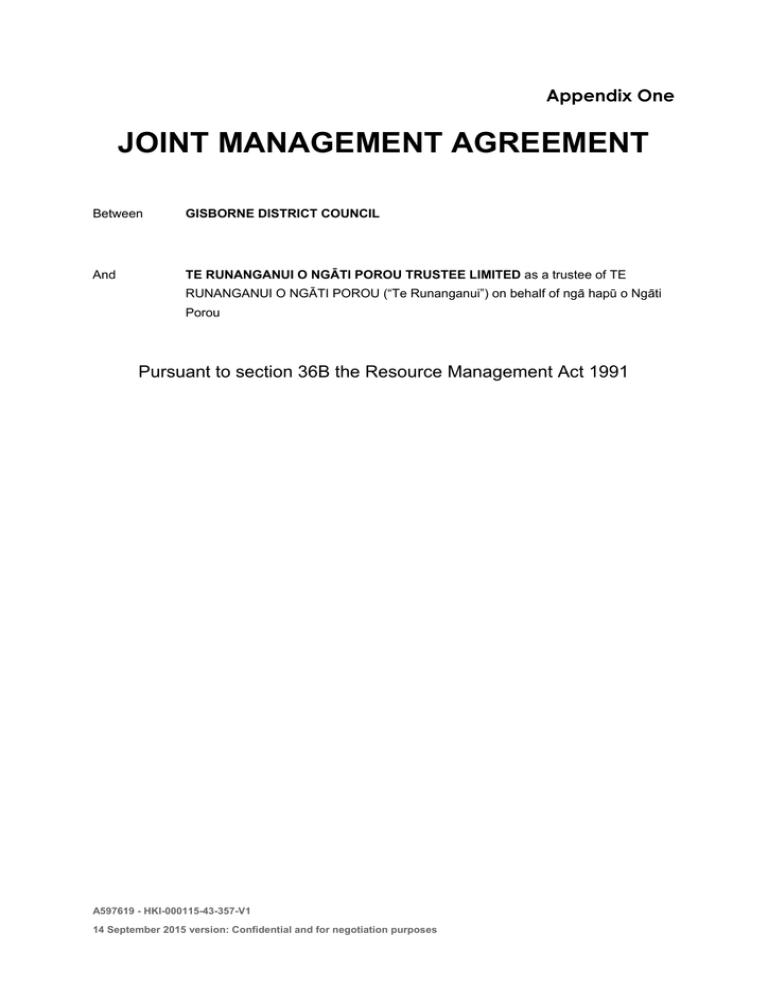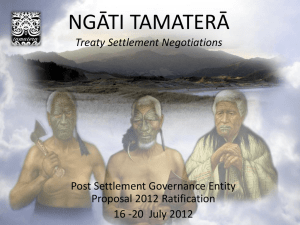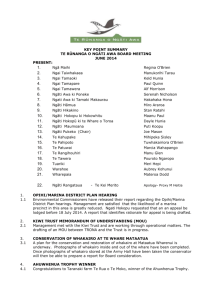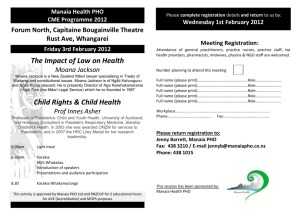JOINT MANAGEMENT AGREEMENT - Gisborne District Council
advertisement

Appendix One JOINT MANAGEMENT AGREEMENT Between GISBORNE DISTRICT COUNCIL And TE RUNANGANUI O NGĀTI POROU TRUSTEE LIMITED as a trustee of TE RUNANGANUI O NGĀTI POROU (“Te Runanganui”) on behalf of ngā hapū o Ngāti Porou Pursuant to section 36B the Resource Management Act 1991 A597619 - HKI-000115-43-357-V1 14 September 2015 version: Confidential and for negotiation purposes PREAMBLE TE WAIU - TE WAI MĀORI MO NGĀTI POROU Mauriora kia Ranginui Ko Io Matua Kore anake Tawhirimatea e muia nei i tona koka i te waiora, Mauriora kia Papatuanuku Ko Ngāti Porou tangata, Ko Ngāti Porou whenua, tona taiao, tona tūrangawaewae, tona papatipu. I te hītanga ake o Maui Tikitiki a Taranga i te whenua nei Whakaeteteete mai Ko Hikurangi Ka tau tona waka a Nukutaimemeha ki te roto o Hinetakawhiti kei ngā tihi tapu o Hikurangi, ara,Te Tone o Houku me te Tipi o Taikehu, e rangona nei te whakatauaki, “Ko Hikurangi te maunga, Ko Waiapu te awa, Ko Ngāti Porou te iwi” Ko te waiutanga mai i Potikirua ki te Toka a Taiau, atu i te Raukumara ki te uru, whakawhiti ki te hikumutu ki te rawhiti Ko te tuanui o tona kainga Ko Ranginui, a Ko Papatuanuku tona papa Ko te wai te toto o Papatuanuku i roto i tona tapu me tona noa. He wai mou!, He wai mau! Hei whakaora i te ngakau o Porou. Nga hapu o Ngati Porou establish their authority, rights and interests in the Wai through descent from Ranginui, Papatuanuku and Tawhirimatea and their uniterrupted orccupation of the Eastern seaboard lands between Potikirua and Te Toka a Taiau since Maui fished up his great fish- Te Ika a Maui. The Wai is the life blood of the land with its ritual and sacred elements and its functional, daily elements. Our relationship and association with the Wai is recorded in our waiata, whakatauaki , the names of our children, rivers, streams, creeks and puna and in our everyday practice. A597619 - HKI-000115-43-357-V1 14 September 2015 version: Confidential and for negotiation purposes PARTIES A. Te Runanganui o Ngāti Porou Trustee Limited (Te Runanganui); and B. The Gisborne District Council (the Council). BACKGROUND A. Te Runanganui is the trustee company of Te Runanganui o Ngāti Porou, a trust established by trust deed dated 14 December 2010. Te Runanganui is the post Treaty of Waitangi 1840 settlement entity for Ngāti Porou. B. Gisborne District Council is a Unitary authority and manages both regional and district Council functions. The Council manages air, soil, water, the coastal environment as well as land use in our urban centres, rural land use, and open spaces on behalf of the district. C. The traditional Ngāti Porou rohe stretches mai i Potikirua ki te Toka a Taiau (Ngāti Porou rohe). D. Te Runanganui and the Council have been discussing ways in which Te Runanganui may, on behalf of Ngā Hapū o Ngāti Porou, more effectively exercise decision-making powers over decisions in the Ngāti Porou rohe. E. Te Runanganui and the Council have agreed to enter into this Joint Management Agreement, which represents a first step with respect to joint decision-making powers in the Ngāti Porou rohe, specifically at this stage, in the Waiapu Catchment. F. The Council acknowledges the current and future aspirations of Ngāti Porou hapū. Specifically, the Council acknowledges: a. That Te Runanganui and Nga hapū o Ngati Porou intend to continue a conversation, through the annual reviews of this Joint Management Agreement and the Joint Management Agreement Forum, with the Council about the application of this Joint Management to the entire Ngāti Porou Rohe. b. The broader aspiration of Ngāti Porou hapū to move to a transfer of powers under the RMA within five (5) years however this future aspirations are outside the scope of this Joint Management Agreement. G. This Joint Management Agreement is intended to positively enhance other mechanisms provided for in, for example, the Ngāti Porou Foreshore and Seabed Deed of Agreement and the Ngāti Porou Deed of Settlement. A597619 - HKI-000115-43-357-V1 14 September 2015 version: Confidential and for negotiation purposes H. The Deed of Settlement between Ngāti Porou and the Crown, recognises the significance of the Waiapu River to Ngāti Porou and the various impacts of erosion to the Waiapu catchment. This is further established through the recognition of the Waiapu River and its tributaries as a statutory acknowledgement area. The Council supports the restoration and preservation of the mauri and wairua of the Waiapu catchment which are integral to enabling kaitieki responsibilities. PURPOSE 1. The purpose of this Joint Management Agreement is to provide a mechanism for Ngā Hapū o Ngāti Porou to share in RMA decision-making within the traditional Ngāti Porou rohe, mai i Potikirua ki te Toka a Taiau, specifically within the Waiapu Catchment. PRINCIPLES OF THE RELATIONSHIP 2. The parties will uphold and work together under this Joint Management Agreement based on: (a) the principles of good-faith and cooperation, and open, timely and transparent information sharing to enable good joint decision-making; (b) the importance of recognising and providing for, as a matter of national importance, the relationship of Ngāti Porou hapū and their culture, traditions and mātauranga with and over their ancestral lands, water, sites, waahi tapū, and other taonga; and (c) the importance to the Council of: (i) a strong relationship with Ngā Hapū o Ngāti Porou, inclusive of Ngāti Porou landowners, that recognises the values and interests of Ngā Hapū o Ngāti Porou; (ii) a strong relationship with Te Runanganui; and (iii) being able to carry out its statutory functions in an effective and efficient manner that meets the needs of its communities: 3. The Council shall ensure that Te Runanganui is kept informed of relevant aspects of preparation, review and changes to all relevant RMA planning documents planning instruments, notified resource consent applications, and plan changes within or affecting the Ngāti Porou rohe. DECISION-MAKING 4. The Council and Te Runanganui will make the following decisions jointly in accordance with this Joint Management Agreement: (a) decisions on notified resource consent applications under section 104 of the RMA within the Waiapu Catchment; (b) decisions on RMA planning documents under clause 10(1) of Schedule 1 of the RMA that affect the Waiapu catchment; and (c) decisions on private plan changes under clause 10(1) of Schedule 1 of the RMA that affect the Waiapu catchment. A597619 - HKI-000115-43-357-V1 14 September 2015 version: Confidential and for negotiation purposes 5. Joint decisions between the parties have the effect of a decision of the local authority according to section 36D of the RMA. 6. In accordance with section 36C of the RMA the Council may act by itself under this Joint Management Agreement when this Joint Management Agreement requires the parties to perform a duty together. However, the Council may only perform or exercise the duty by itself in the following circumstances: (a) where a decision is required in relation to a duty under this Joint Management Agreement and Te Runanganui has advised Council that it is unable to meet any timeframe required to make the decision; or (b) where the Joint Management Agreement does not provide a method for making a decision of the kind required. 7. Nothing in this JMA is intended to limit, or negatively affect or derogate from, the Council’s existing statutory and other obligations to Ngāti Porou. PROCESS FOR OTHER DECISIONS 8. Te Runanganui and the Council will work together to: (a) develop and agree guidance for the Council's resource consents team in relation to how decisions should be made regarding notification of applications for resource consent in the Waiapu Catchment; and (b) as part of the process referred to in clause [10], build the capacity of both Te Runanganui and the Council to allow the parties to work more closely together in the making of notification decisions; (c) develop and agree protocols with respect to the commissioning of environmental research (including but not limited to how research will be commissioned and who can access results of such research) conducted in the Ngāti Porou rohe; and (d) co-create and agree the Waiapu Catchment Plan. JOINT MANAGEMENT AGREEMENT FORUM 9. Te Runanganui and the Council will meet every four months to discuss: (a) the operation of this Joint Management Agreement; (b) other matters relating to the interests of Ngāti Porou in the Waiapu catchment; (c) capacity building as referred to in clause [10]; and (d) other matters relating to the functions of the Council, including operational matters and the exercise of functions under statutes such as the RMA and LGA in the Waiapu catchment. CAPACITY BUILDING A597619 - HKI-000115-43-357-V1 14 September 2015 version: Confidential and for negotiation purposes 10. Te Runanganui and the Council will work together under this Joint Management Agreement to increase the capacity of the Council, Ngā Hapū o Ngāti Porou (inclusive of Ngāti Porou landowners) and Te Runanganui in relation to the matters covered by this Joint Management Agreement. 11. The approaches to capacity building could include: (a) training for Council staff on Ngāti Porou tikanga and values in relation to the Waiapu catchment, and how those matters should form part of the Council's processes; (b) training for Council staff on sites of significance to Ngāti Porou in the Waiapu catchment; (c) training for Te Runanganui staff and Ngā Hapū o Ngāti Porou on Council processes and other matters (including, but not limited to, consenting processes, monitoring and health and safety); (d) reciprocal secondments; and (e) reciprocal seminars and workshops on specific topics of interest. PROCESS AND REPRESENTATION 12. The Council and Te Runanganui will select hearing panel members to act as the decisionmakers pursuant to clause 4 on the following basis: (a) the default will be three panel members, made up of one member appointed by each party, and a chairperson appointed in accordance with clause [13]; (b) the parties may agree that for a particular decision there will be one panel member, in which case the parties must agree on that member; and (c) the parties may agree that for a particular decision there will be five panel members, made up of two members appointed by each party, and a chairperson appointed in accordance with clause [13]. 13. Following the appointment pursuant to clause [12], the selected members shall then meet and identify an additional member and chairperson for that panel. If consensus is not reached on this appointment the standard Council list of independent commissioners will be used for selection purposes and the fifth member and chairperson will be appointed by Council officers. 14. The full panel and chairperson, appointed pursuant to clauses [12 and 13] (the Panel) will need to be identified a minimum of 20 working days prior to the hearing. 15. Panel members appointed by the Council appointed pursuant to clauses [12 and 13] will be expected to have an understanding of Ngāti Porou tikanga and perspectives. For panel members that do not have this level of knowledge, training will be jointly provided by Council and Ngāti Porou. TECHNICAL CAPABILITY OR EXPERTISE 16. Te Runanganui and the Council will only appoint panel members where they have the technical or special capability or expertise to perform or exercise the function, power, or duty under this Joint Management Agreement, pursuant to section 36B(1)(b)(i)(B) of the RMA. A597619 - HKI-000115-43-357-V1 14 September 2015 version: Confidential and for negotiation purposes VOTING RIGHTS 17. All members of the Panel will have equal voting rights at the hearing, and the Chairperson has the casting vote in the case of a split vote. 18. If, 10 days before the commencement of the hearing, any members withdraw from the Panel, the remaining panel shall continue to hear the matter provided there is at least three Panel members present. 19. In the case of four Panel members, at least three Panel members must vote in favour of a vote for such a vote to pass. OTHER MECHANISMS 20. This Joint Management Agreement will operate in a manner that enhances, and does not negatively affect or derogate from, relevant redress mechanisms provided for in the: (a) the Ngāti Porou Deed of Settlement; (b) the Ngāti Porou Foreshore and Seabed Deed of Agreement; (c) the Waiapu Accord; and (d) any other agreements that exist at the time of this Joint Management Agreement, or may be entered into, that may affect the matters provided for in this Joint Management Agreement. CONFLICTS OF INTEREST 21. Conflicts of Interest shall be considered and identified at the earliest possible moment and brought to the attention of the Panel at the earliest possible time, and in accordance with the Controllers and Auditor Generals Guidelines: Managing conflicts of interest: Guidance for public entities. 22. A panel member is not precluded by the Local Authorities (Members' Interests) Act 1968, or any other regulatory mechanism, from discussing or voting on a matter merely because the member has Ngāti Porou whakapapa. REMUNERATION OF PANEL MEMBERS 23. Te Runanganui appointed members of any panel selected according to this Joint Management Agreement will be charged at the same rate as the Council Commissioners pursuant to clause 7.1, schedule 7 of the Local Government Act 2002 and section 19 of the Remuneration Authority Act 1977. 24. The additional or fifth panel member will be charged at their standard charge out rate. RESOURCING 25. The Council and Te Runanganui will share resources (including, but not limited to, expertise, staff and funding) to ensure: A597619 - HKI-000115-43-357-V1 14 September 2015 version: Confidential and for negotiation purposes (a) Ngāti Porou hapū representatives are prepared to undertake the Making Good Decisions course (for example, through the development of a precursor to the Making Good Decisions course that could be jointly run by the Council and Te Runanganui); and (b) Ngāti Porou representatives have the necessary skills and resources to undertake the Making Good Decisions course. FINANCIAL IMPLICATIONS FOR THE PURPOSES OF THE RMA 26. The Parties agree that the matters provided for in clause [25] comply with section 36B(c) of the RMA in relation to: (a) the resources that will be required for the administration of this Joint Management Agreement; and (b) how the administrative costs of this Joint Management Agreement will be met. CONFLICT RESOLUTION 27. The Parties acknowledge the requirement for effectiveness and efficiency in delivering resource management decisions. Accordingly, any conflict or conflict resolution process shall not be incompatible with Council’s duty to efficiently process resource management decisions and shall follow the dispute resolution process in this clause. 28. In the event of a dispute between the Parties, the Parties will use best efforts to informally resolve the dispute in good faith through dialogue and negotiation at the management level (CEO to CEO in the first instance). If a dispute cannot be resolved by direct discussion and negotiation, either party may appoint a suitably qualified mediator from LEADR NZ (Leading Edge Alternative Dispute Resolvers) or AMINZ (Arbitrators & Mediators Institute of New Zealand) to facilitate the resolution of conflict. 29. If the parties do not reach agreement over the appointment of a mediator, the mediator shall be appointed by the President (or equivalent) of LEADR or AMINZ. REVIEW PROCESS 30. This Joint Management Agreement will be formally reviewed every 12 months after the adoption date, subject to the agreement of both Parties (the Review). 31. The Review will be undertaken jointly by the Council and Te Runanganui officers and findings of the review will be formally presented to the Council and Te Runanganui. 32. The Review shall include: (a) a summary of the joint hearings for that 12 month period including the number of hearings, decisions made and appeals received; (b) any identified issues that have arisen at any step in the process as identified by the Council and Te Runanganui officers, and all the decision makers involved; (c) any issues that have been identified by applicants or submitters as a result of a post hearing survey; A597619 - HKI-000115-43-357-V1 14 September 2015 version: Confidential and for negotiation purposes (d) any additional functions, powers or duties which apply under this Joint Management Agreement; and (e) 33. a recommendation to either: (i) continue the Joint Management Agreement with no changes; (ii) amend the Joint Management Agreement; or (iii) terminate the Agreement according to clause [35]. Any changes deemed necessary from this Review following a recommendation shall be formally ratified by full Council and Te Runanganui, respectively. 34. The Review will be resourced jointly by Te Runanganui and the Council. TERMINATION 35. Subject to the Review process pursuant to clauses [30 to 34], any Party to this Joint Management Agreement may terminate the Joint Management Agreement by giving the other party 20 working days’ notice, in accordance with section 36E of the RMA. 36. Without limiting the effect of section 36E of the RMA, if either Party intends to terminate the Joint Management Agreement, a discussion between the Authorised Representatives will occur at least 20 working days prior to any notice to discuss the reasons for such termination, whether there are alternatives to termination and whether there are other matters that will need to be resolved on termination. ATTESTATION 37. This Joint Management Agreement is: (a) freely entered into by all parties in the spirit of good faith with the intention of creating a meaningful long-term partnership; and (b) the entire Joint Management Agreement and includes all prior agreements both written and verbal. 38. Authorised Representatives of Te Runanganui and the Council sign this document as verification of their Party’s commitment to this Joint Management Agreement. DEFINITIONS 'Adoption Date' means: [To be determined] 'Authorised Representatives' means: [To be determined] 'Hearing Panel Member' means: A597619 - HKI-000115-43-357-V1 14 September 2015 version: Confidential and for negotiation purposes Any person pursuant to sections 39A and 39B, including councillors and independent commissioners who hold appropriate qualifications and training that have completed the Approval of accreditation Making Good Decisions Programme for RMA decision-makers. 'Joint Management Agreement' means: As defined in Section 2 of the RMA and means an agreement that – (i) is made by a local authority with one or more – (1) public authorities, as defined in paragraph (b) of the definition of “public authority”: (2) (b) Iwi authorities or groups that represent hapu; and provides for the parties to the joint management agreement jointly to perform or exercise any of the local authority’s functions, powers, or duties under this Act relating to a natural or physical resource; and (c) specifies the functions, powers, or duties; and (d) specifies the natural or physical resource; and (e) specifies whether the natural or physical resource is in the whole of the region or district or part of the region or district; and (f) may require the parties to the joint management agreement to perform or exercise a specified function, power, or duty together; and (g) if paragraph (f) applies, specifies how the parties to the joint management agreement are to make decisions; and (h) may specify any other terms or conditions relevant to the performance or exercise of the functions, powers, or duties, including but not limited to terms or conditions for liability and funding. 'LEADR' means: Leading Edge Alternative Dispute Resolvers Address: PO Box 10991, Level 8, Terrace Legal House, The Terrace, Wellington Telephone: 04 470 0110. 'Ngāti Porou Foreshore and Seabed Deed of Agreement' means: Ngāti Porou Foreshore and Seabed Deed of Agreement between the Crown and Ngāti Porou (dated 7 August 2008, pursuant to the Foreshore and Seabed Act 2004) and any subsequent Deed of Agreement pursuant to the Marine and Coastal Area Act 2011. 'Ngāti Porou Deed of Settlement' means: Ngāti Porou Deed of Settlement between the Crown and Ngāti Porou in relation to the settlement of the historical Treaty of Waitangi grievances (dated 22 December 2010). 'Ngāti Porou rohe' means: A597619 - HKI-000115-43-357-V1 14 September 2015 version: Confidential and for negotiation purposes For the purposes of this Joint Management Agreement, the Ngāti Porou rohe is the area of interest contained in the Ngāti Porou Deed of Settlement (attached to this Joint Management Agreement as Appendix 1); mai i Potikirua ki te Toka a Taiau, to the extent that the appended area of interest is within the Gisborne Unitary Authority’s boundaries. 'Relevant RMA planning documents planning instruments' means: RMA planning documents as set out in Appendix 3 to this Joint Management Agreement. 'RMA' means: Resource Management Act 1991. 'Waiapu Accord' means: [Partnership between Ministry of Primary Industries, Gisborne District Council and Te Runanganui o Ngati Porou Trustee Limited to restore the Waiapu Catchment. 'Waiapu Catchment' means: For the purposes of this Joint Management Agreement, the Waiapu Catchment is depicted in the map attached to this Joint Management Agreement as Appendix 2. A597619 - HKI-000115-43-357-V1 14 September 2015 version: Confidential and for negotiation purposes Appendix 1 – Ngāti Porou rohe A597619 - HKI-000115-43-357-V1 14 September 2015 version: Confidential and for negotiation purposes Appendix 2 – Waiapu Catchment Waiapu A597619 - HKI-000115-43-357-V1 14 September 2015 version: Confidential and for negotiation purposes Appendix 3 – RMA Planning documents administered by the Gisborne District Council Note : This list is non-exclusive and will be added to, as additional plans are notified, on a regular basis 1. Gisborne District Council Regional Policy Statement 2002 2. Part Operative Combined Regional Land and District Plan for the Gisborne District 3. Regional Air Quality Plan for the Gisborne District 4. Regional Plan for Discharges to land and water, waste management and hazardous substances 5. Regional Coastal Environment Plan 6. Transitional Regional Plan A597619 - HKI-000115-43-357-V1 14 September 2015 version: Confidential and for negotiation purposes


